The AMD Zen and Ryzen 7 Review: A Deep Dive on 1800X, 1700X and 1700
by Ian Cutress on March 2, 2017 9:00 AM ESTBenchmarking Performance: CPU System Tests
Our first set of tests is our general system tests. These set of tests are meant to emulate more about what people usually do on a system, like opening large files or processing small stacks of data. This is a bit different to our office testing, which uses more industry standard benchmarks, and a few of the benchmarks here are relatively new and different.
PDF Opening
First up is a self-penned test using a monstrous PDF we once received in advance of attending an event. While the PDF was only a single page, it had so many high-quality layers embedded it was taking north of 15 seconds to open and to gain control on the mid-range notebook I was using at the time. This put it as a great candidate for our 'let's open an obnoxious PDF' test. Here we use Adobe Reader DC, and disable all the update functionality within. The benchmark sets the screen to 1080p, opens the PDF to in fit-to-screen mode, and measures the time from sending the command to open the PDF until it is fully displayed and the user can take control of the software again. The test is repeated ten times, and the average time taken. Results are in milliseconds.
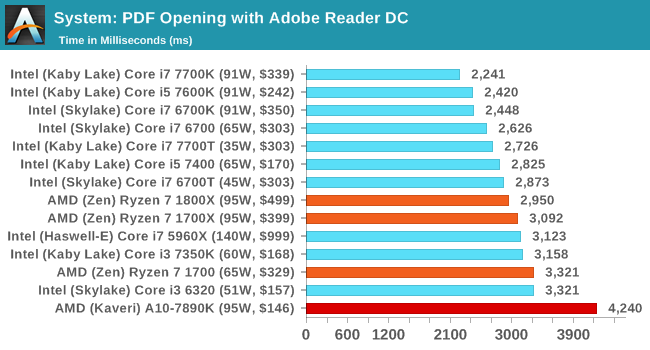
FCAT Processing
One of the more interesting workloads that has crossed our desks in recent quarters is FCAT - the tool we use to measure stuttering in gaming due to dropped or runt frames. The FCAT process requires enabling a color-based overlay onto a game, recording the gameplay, and then parsing the video file through the analysis software. The software is mostly single-threaded, however because the video is basically in a raw format, the file size is large and requires moving a lot of data around. For our test, we take a 90-second clip of the Rise of the Tomb Raider benchmark running on a GTX 980 Ti at 1440p, which comes in around 21 GB, and measure the time it takes to process through the visual analysis tool.
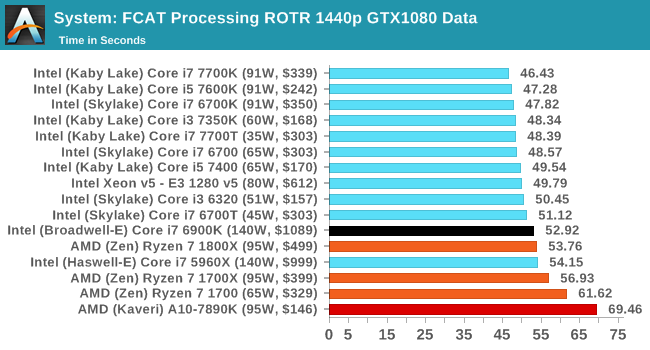
3D Particle Movement v2.1
This is the latest version of the self-penned 3DPM benchmark. The goal of 3DPM is to simulate semi-optimized scientific algorithms taken directly from my doctorate thesis. Version 2.1 improves over 2.0 by passing the main particle structs by reference rather than by value, and decreasing the amount of double->float->double recasts the compiler was adding in. It affords a ~25% speed-up over v2.0, which means new data.
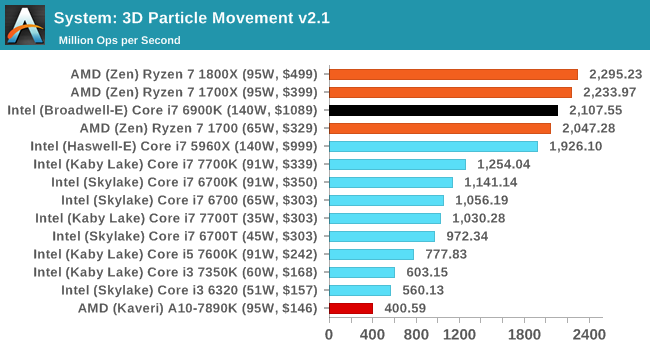
DigiCortex 1.16
Despite being a couple of years old, the DigiCortex software is a pet project for the visualization of neuron and synapse activity in the brain. The software comes with a variety of benchmark modes, and we take the small benchmark which runs a 32k neuron/1.8B synapse simulation. The results on the output are given as a fraction of whether the system can simulate in real-time, so anything above a value of one is suitable for real-time work. The benchmark offers a 'no firing synapse' mode, which in essence detects DRAM and bus speed, however we take the firing mode which adds CPU work with every firing.
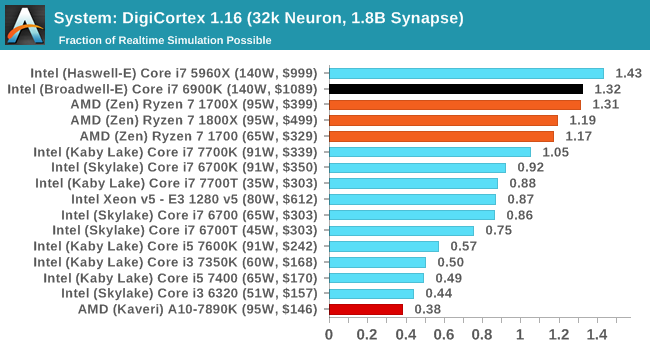
Agisoft Photoscan 1.0
Photoscan stays in our benchmark suite from the previous version, however now we are running on Windows 10 so features such as Speed Shift on the latest processors come into play. The concept of Photoscan is translating many 2D images into a 3D model - so the more detailed the images, and the more you have, the better the model. The algorithm has four stages, some single threaded and some multi-threaded, along with some cache/memory dependency in there as well. For some of the more variable threaded workload, features such as Speed Shift and XFR will be able to take advantage of CPU stalls or downtime, giving sizeable speedups on newer microarchitectures.
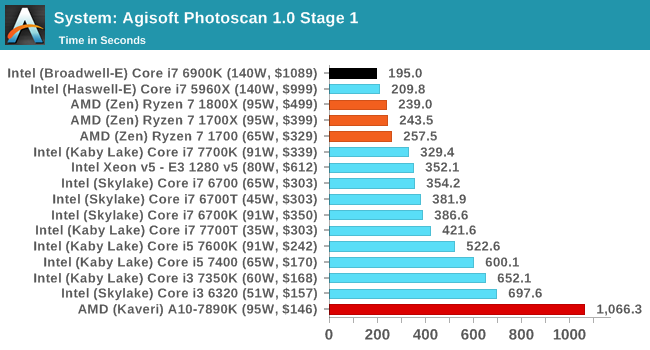
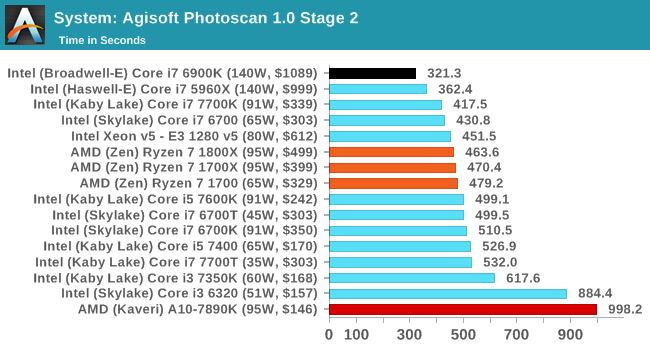
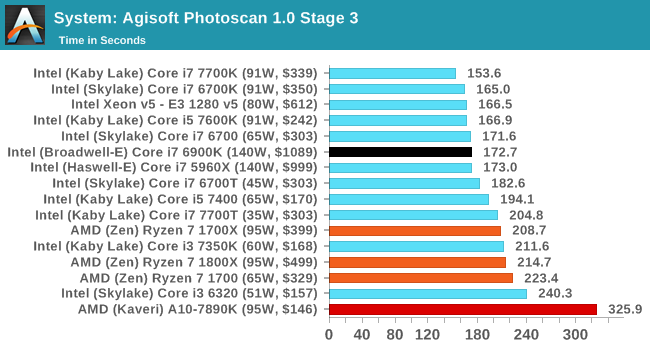
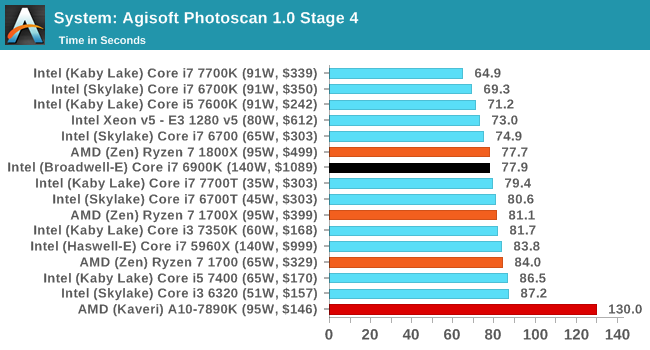
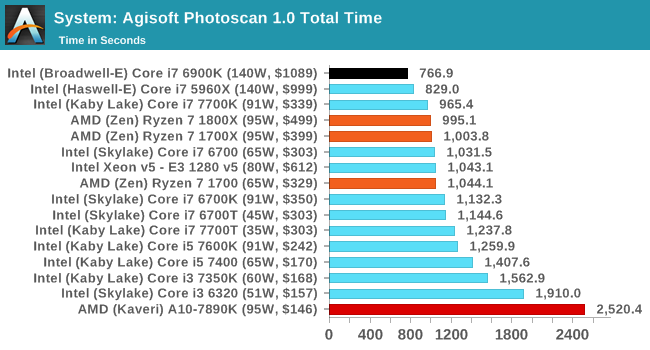










574 Comments
View All Comments
BurntMyBacon - Friday, March 3, 2017 - link
@Gothmoth: "gamer... as if the world is only full with idiotic people who waste their lives playing shooter or RPG´s."PC Gaming happens to be one of the few growing areas in the PC market. Not everyone games, but for those that do, the 7700K is still worth considering. Dropping $500 on the 1800X may not be the best call for those that don't take advantage of the parallelism. Of course, the 1800X wasn't really meant for people who can't take advantage of the parallelism. AMD will have lower cost narrower processors to address that gap. I'm curious as to how the performance/price equation will stand once AMD releases their upper end 6c/12t and 4c/8t processors.
Beany2013 - Friday, March 3, 2017 - link
Sod the 1800X - I need a new VM server, and if I want all the threads (sixteen), I can either drop £450 on a Xeon E5 2620 at 2.1-3ghz (cheapest Intel 16 thread option I can find), or I can spend £100 less, and get a Ryzen 7 1700 (3.0-3.7ghz) and put that extra money towards more RAM so I can run more VMs and get more work done.For those of us who aren't high end gamers - which is basically almost everyone, and a far more significant market - these chips may well give Intel a bloody nose in the workstation space; AMD have confirmed they'll use ECC RAM quite happily.
Photographers, videographers, CAD-CAM, developers etc are a bigger market in terms of raw units than high end gamers, and these chips look like being a pretty compelling option as it stands.
Steven R
Beany2013 - Friday, March 3, 2017 - link
(VM server for home, I should have noted - for work, I'll see how the Ryzen based opterons and supermicro mobos etc pan out - money is important in these factors, but I'm not a moron, and I'm not going to run production gear on gaming hardware, natch....)BurntMyBacon - Friday, March 3, 2017 - link
@Beany2013: "I need a new VM server, and if I want all the threads (sixteen), I can either drop £450 on a Xeon E5 2620 at 2.1-3ghz (cheapest Intel 16 thread option I can find), or I can spend £100 less, and get a Ryzen 7 1700 (3.0-3.7ghz) and put that extra money towards more RAM so I can run more VMs and get more work done."It is clear by this statement that you fall into the category of people that can take advantage of the parallelism. Therefore, my statement doesn't apply to your presented in the slightest.
I don't disagree that the Ryzen 7 series has a lot to offer to a lot of people (myself included). If I were in the market today, I'd be looking long and hard at an R7 1700X. The minor drop in gaming performance is less significant to me than the increase in performance for many other tasks I use my computer for. I do a little bit of dabbling in a lot of different things (most of which benefit from high thread count). I have noticed that for the set of applications I have open simultaneously and the tasks I have running, my computer is more responsive with more cores or threads, but single threaded performance is still important to the individual tasks.
In my workflow: (i3 < i5/FX-8xxx < i7 <? R7)
My point was that there is in fact a not so insignificant market of people putting computers together for the primary purpose of gaming. This market appears, by all metrics, to be growing. For this market, Intel's i7-7700K or better yet i5-7600K are still viable options that provide better performance/price than AMD's current options. I'll repeat: "AMD will have lower cost narrower processors to address that gap. I'm curious as to how the performance/price equation will stand once AMD releases their upper end 6c/12t and 4c/8t processors."
Cooe - Sunday, February 28, 2021 - link
"or better yet i5-7600K"Arguably the most short-sited statement in this entire comments section lol. The 4c/4t i5's had roughly equal gaming performance to Ryzen at launch but with ZERO headroom left for the future. This is why the i5-7600K gets absolutely freaking ROFLSTOMPED by the R5 1600 in modern titles/game engines.
JMB1897 - Friday, March 3, 2017 - link
Compelling, but I don't think it's totally there yet. I'd be worried about the memory issues. Increased latency as you add more DIMMs and dual vs quad channel. I'd spend that extra 100 on a Xeon personally.Sttm - Friday, March 3, 2017 - link
Thats who buys off the shelf CPUs thats cost $$$, Gamers. Thats who AMD needs to please with their product. GAMERS. Thats why AMD's stock has been tanking since Ryzen reviews went up, because GAMERS are the demographic that matters when it comes to performance CPU sales.deltaFx2 - Saturday, March 4, 2017 - link
@Sttm: You have an inflated opinion of the impact of gamers. No, AMD's stock isn't tanking because of gamers. I suggest you also look at Nvidia's stock, which is well down from its high of ~120, to ~98. Wed-Friday, Nvidia dropped from 105 to 98, and it dipped below that to ~96 at one point. That's roughly 7-8%. The two stocks are often correlated on drops, with AMD amplifying nvidia's drop. Both do GPUs, see? Some people make tonnes of money shorting AMD (and in recent times have lost their shirt doing so).Here's the truth: All Desktop, as per Lisa Su, is a 5 bn TAM market and gaming is part of this (let's say 50%). Nothing to scoff at, sure, but compared to laptop and server, it's a rounding error. There's NOTHING in these tests/reviews to suggest that AMD will suck in those markets; in fact, quite the opposite: power looks good, perf looks good. AMD's stock (long term) won't tank on the whims of gamers. They help get the mindshare, which is the only reason they're worth catering to (they tend to be a vocal, passionate, and sometimes irrational lot. You won't see datacenter gurus doing the stuff that gamers do. They certainly won't shoot each other over whose GPU is the best).
cmdrdredd - Saturday, March 4, 2017 - link
Believe it or not there are millions of people worldwide who pretty much use their PC for two things. The internet (web browsing, email etc) and gaming. You don't need 16 threads to check email and read forums either so gaming performance is going to be critical. It's not just the CPU performance, it's the entire platform that contributes to Gaming related performance.sans - Thursday, March 2, 2017 - link
Yeah, stick with Intel because Intel is the standard and its products are the best for each respective market. AMD is a total failure.